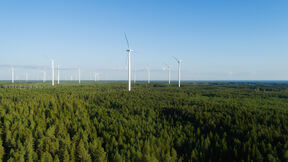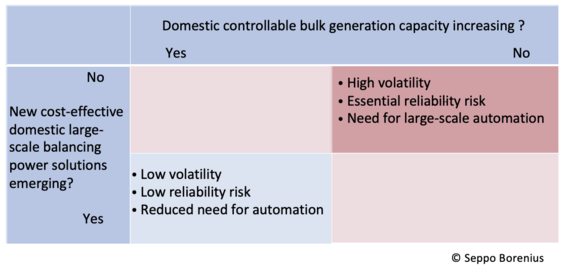New research: Reliable electricity can no longer be taken for granted – the green transition may require fossil fuel as backup

Fluctuations in electricity prices and occasionally high hourly rates have been the subject of much public discussion in recent years. However, the fact that electricity has always been easily and reliably available in Finland, as long as one is willing to pay the price, has received less attention.
Unlike Portugal and Spain last year, Finland's electricity system has been reliable and the country has not experienced large-scale blackouts. However, this may not necessarily be the case in future: controllable electricity production that is independent of the weather has been shut down, and transmission connections to other countries are limited.
Solar and wind power alone are not enough
In a new peer-reviewed study, researchers at Aalto University developed a statistical model to analyse potential development scenarios for Finland's electricity system by 2035, examining the underlying cause-and-effect relationships.
The model was based on Finland's current electricity production capacity, divided by energy source. A panel of energy system experts was consulted during the development of the model. The interviewees represented both the energy industry and the scientific community.
According to the results, there is less than a 50% probability that Finland's electricity system will remain reliable and relatively easy to manage in the 2030s (the scenario at the bottom left of the figure).

'We need energy investments that can work even when there is no wind or sunlight, otherwise we jeopardise the entire basis of the green transition," says Dr Seppo Borenius, the lead author of the study.
While automation can improve controllability, it does not solve the problem of insufficient electricity production due to major disruptions or adverse weather conditions. Furthermore, automation increases the complexity, vulnerability and cost of the system.
Solutions can be found – but they must be sought quickly
According to the study, the security of the electricity supply can be improved in three ways: demand response, large-scale battery storage and gas and multi-fuel power generation.
However, none of these alone is sufficient. For instance, the power used by electrified district heating can be reduced for a few days, but not for several consecutive weeks if there is no wind. Even large-scale battery storage facilities can only respond to demand peaks lasting a few hours. Researchers emphasise that the problem must be addressed quickly.
'Investment cycles in the energy sector are long. Every delay increases the risk for the future,' Borenius points out.
Fossil fuel backup power is needed for security
The proposal is partly based on the use of fossil fuels. Does this mean that we are unable to transition to renewable energy sources?
According to the researchers, this is not the case, as gas and multi-fuel power would only serve as backup and would not need to be used frequently.
'Although it may seem somewhat paradoxical that the green transition requires fossil fuel-based electricity as a backup, this is not a step backwards – it is insurance,' says Borenius.
Link to the research:
(*) Borenius et al. 2025: Generation and Balancing Capacity in Future Electric Power Systems - Scenario Analysis Using Bayesian Networks, IEEE Access, July 2025
Contact information:
Dr. Seppo Borenius
Aalto University
School of Electrical Engineering
Phone: +358 50 5143234
email: seppo.borenius@aalto.fi
Professor Petri Mähönen
Aalto University
School of Electrical Engineering
Phone: +358 50 4629913
email: petri.mahonen@aalto.fi
Read more news

Join Unite's Well-Being Workshop Series
The interactive Zoom sessions are designed to support doctoral students’ well-being, strengthen a sense of belonging, and offer practical tools for success in their academic journey.Create your CV easily with the Research.fi profile tool
Aalto University’s researchers can now create a CV using the CV tool in the Research tool service. The tool generates an editable Word CV based on your Research.fi profile information, following the official TENK CV template.






